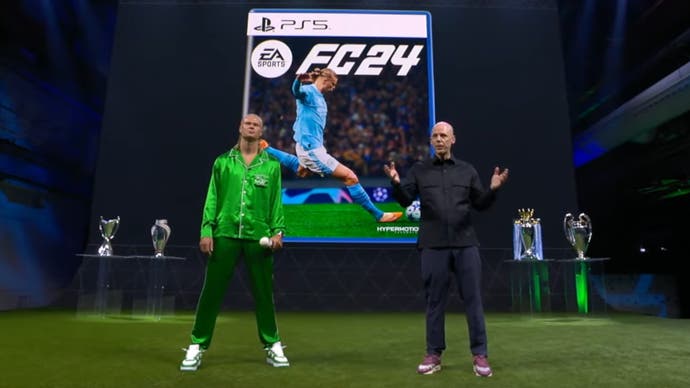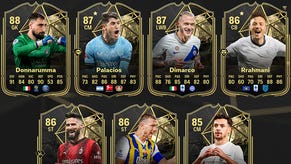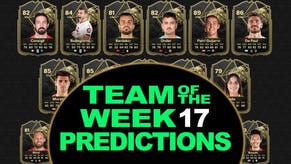EA Sports FC 24 boss on sportswashing, engagement, and Gen Z football fans
"Our role is to provide players with exactly what's going on in football."
"You can change your wife, your politics, your religion. But never, never can you change your favourite football team," goes the old Eric Cantona quote - but over time that sentiment has started to change.
Younger fans, particularly the group broadly defined as Gen Z, are now more inclined to support individual players throughout their careers, as opposed to the usual method of one club 'til death do us part, according to one much-discussed study by Copa90, and the change in younger fans' approach has some of the game's older members a little worried.
Generally, the argument goes, young people aren't following football in the traditional way - not watching full 90-minute matches, not following clubs as religiously as today's influencer-style players, and generally not being as invested in the sport - and so therefore the sport had become "ill," in the words of Real Madrid president Florentino Pérez, and therefore needed saving. "By 2024 we're dead."
That pervading fear about younger fans is part of the reasoning behind the so-far failed attempts at launching the infamous European Super League, where the plan was for a small group of European "big clubs" to be guaranteed permanent membership, NFL-style, and face each other much more regularly. Those plans fell apart amongst mass fan protests at the notion of a competition without risk of relegation or emphasis on sporting merit, but the idea is still partially alive.
Part of the problem for Pérez, for instance, is video games, which he sees as vying for the attention of the younger generation - and EA Sports has certainly seen plenty of attention with FIFA. During last Thursday's glitzy reveal of FC 24, EA Sports' rebranded version minus the FIFA licence, the developer-publisher boasted FIFA 23 has seen over 9bn hours of playtime. At the event, Eurogamer had a brief chance to speak with EA Sports FC's general manager, Nick Wlodyka, who said that the game is now regularly seeing "100 million players in game in a month."
"It's also consistently through the year," he said, "and that's probably how the game has really changed over the last number of years." In the past, FIFA would generally see most of its interest from around September to February, he explained, "and then it would kind of dip off after that." Now, Wlodyka said, "we see players in the game year round. That's special."
Interestingly enough, EA Sports has seen its own research on player interest mirror some of those wider worries about the sport. Wlodyka said: "We definitely do a fair amount of research across all different types of fans - young fans and older fans - and there are generational differences, no doubt about that."
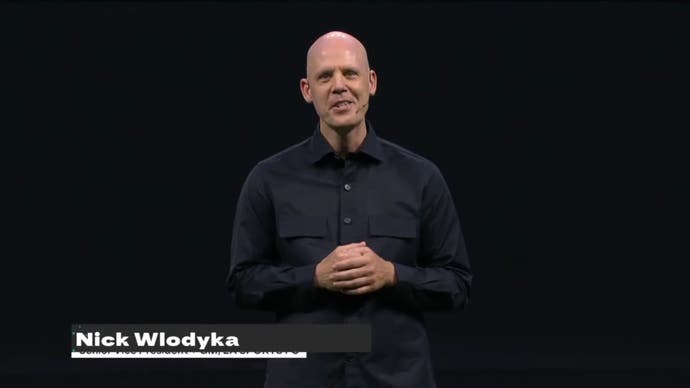
“Both from what we see in game and anecdotally, through our research as well, the younger generation of fans - we call them Gen Z - very much have their favourite players, and probably are a little less committed and passionate - not in all cases, but in some cases, particular clubs. Although the allegiances to clubs do still run through family lines, so that hasn't changed."
Gen Z have "much more interest in players", he continued, which perhaps goes some way to explain FC's slightly unusual reveal trailer (and not-so-well-received Ultimate Edition cover art - to which Wlodyka also responded) that featured Manchester City's Pep Guardiola in the dressing room giving a team talk to star players in Liverpool and Real Madrid kits, amongst others.
That's also a part of EA Sports' attempt to target a more "global" audience as the sport's changed. "Part of what we need to do is make sure we capture what's unique about the sport, the culture in and around it in all different parts of the world. It can't just be about - no offence intended - the UK, or France, or even North America where, year-over-year, it's just exploded," Wlodyka added. "We're seeing that also across all of our games, we're seeing it on console, seeing it in FIFA mobile as well."
The flipside to all of that growing attention of course, especially from young players, is EA Sports' reliance on its infamously less-than-subtle engagement mechanics, with a multitude of notifications and daily and weekly objectives built into Ultimate Team, its most popular (and controversial) mode. Wlodyka, however, pushed back on the idea that the studio's approach was unhealthy.
"I think part of our philosophy has always been: let's not design experiences that are compelling people to come back," he said, or make players feel "'I have to come in multiple times a day to earn an extra award, or I have to come in multiple times a week to earn my reward' - we've tried to make sure that we keep that balance.
"We make sure that from a progression standpoint we're building pieces in place so that, if they want to play throughout the year, they're constantly going to get fresh experiences, but," he claimed, the studio is "trying to make sure we're not pushing them to come in all of the time, because that is a really important piece [of what EA considers when developing the game]. And as a dad myself, that's something I'm very passionate about with my son, and making sure that irrespective of whether it's games or other things, they're not always on it. So we think about that a lot."
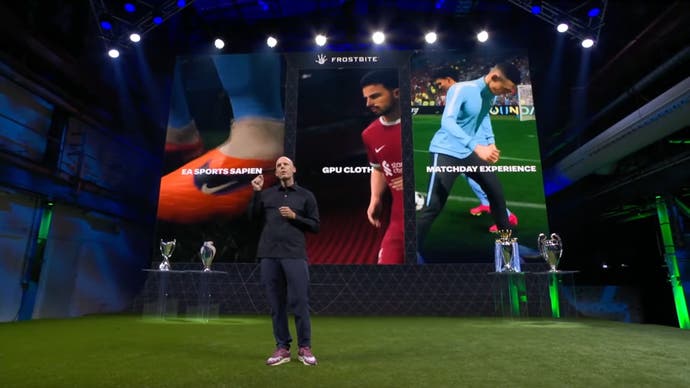
Naturally, that leads us on to a discussion of EA Sports' continued use of loot boxes in Ultimate Team, specifically the card packs that have attracted attention from multiple government regulators and exasperated players over multiple years now. In late 2021, Eurogamer sat down with Chris Bruzzo, EA's chief experience officer at the time to discuss the topic, with Bruzzo emphasising "children should not be spending in our game," but also that, ultimately, in-game spending on packs comes down to "player choice." Speaking with Wlodyka that approach seems to remain exactly the same - despite an opportunity to rework its monetisation with this year's big rebrand to FC 24.
"The place I would start is: one of the things we thought a lot about as we were going through the rebrand is making sure the things our players love most about the franchise will continue to go forward with them," Wlodyka said.
"Players have a choice whether they want to use time or they want to spend." - Nick Wlodyka, EA Sports.
"As it pertains specifically to Ultimate Team - gosh, we're now 14 years on, with Ultimate Team? It's something our players absolutely love, we've really made sure that choice is paramount, that everything we offer is available to players, and they have a choice whether they want to use time or they want to spend. It's always a choice. And it's always grounded in making sure they feel like they're getting great value from it.
"At the end of the day, the single most important thing across the entire team is that they're having fun. And so wind all the way back to your earlier question, just sitting around 'how much is too much': if you're really, really focused on delivering fun experiences, then you're always going to come back to that, because at a certain point too much of anything is no longer fun.
"In order for us to be able to grow a football platform in the way we talked about today," Wlodyka continued, "we have to retain that element of making sure everything we do, in order to have more than 100 million players coming into our games, is fun. And that will continue to be a core ethos of our team."
Wlodyka was similarly coy about the notion of moving away from annualised, full-price games in the future, despite the opportunity to change things up this year and the continued focus on heavy in-game monetisation. "I wouldn't sit here and say, 'we're definitely not doing this' or 'we're definitely doing that,'" he said, adding that if players were asking for a change then "that may mean moving to different things we haven't done in the past."
Part of EA Sports' "global" approach to representing football in FC 24, meanwhile, will see the continued presence of the controversial Saudi Pro League, which joined the FIFA series in 2018. EA Sports signed a deal to continue featuring the league last year, extending the partnership by another four years. Since then, the SPL has embarked on a major, Saudi government-backed spending spree where high-profile players like Cristiano Ronaldo, Karim Benzema and N'Golo Kanté have headed out to join several of its clubs, along with managers like Steven Gerrard and a slew of other players this summer.
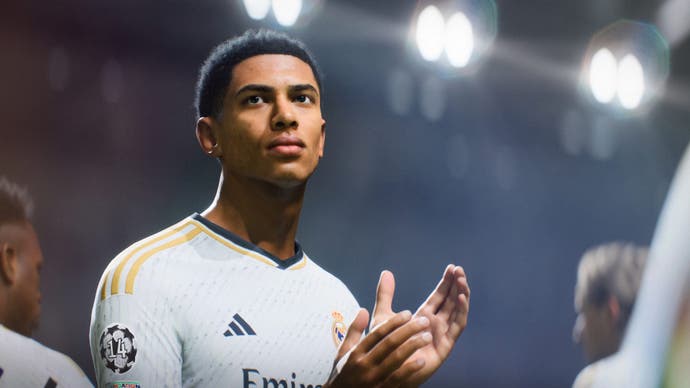
The sudden arrival of that league, and several of its top clubs being backed by Saudi Arabia's Public Investment Fund (PIF) - which also now owns Newcastle United - has enhanced already significant concerns about sportswashing in football - the practice of governments with poor human rights records using investment in entities, like football clubs, to effectively buy the loyalty of some fans to protect, improve, or distract from their reputation. It's also a minority shareholder of about nine percent of EA - and many other video game publishers - as it seeks to diversify the Saudi Kingdom's investments beyond its traditional reliance on fossil fuels.
"We're very attuned to it," Wlodyka said of the situation. "We just like you are watching it, and talking a lot about some of the changes that we're seeing in this sport of football - and what does this mean for the future of football?"
What does this mean for EA Sports' position - and do concerns of "gameswashing" come to mind, given the PIF's own investment in EA, and football in general? "I think we always come back to authenticity. And our role is to provide our players with exactly what's happening in the world of football," Wlodyka said. "What we try to focus on is: okay, what's happening in the sport and how do we deliver that experience?"
Finally, in terms of EA Sports' ownership - and amongst a wave of consolidation with Microsoft's pending acquisition of Activision Blizzard edges closer, Wlodyka suggested that EA Sports' future remains best as a part of EA overall. The company split EA Games into two parts earlier this year - with EA Sports, the developer of FIFA and FC, as well as the Madden and F1 series, splitting from EA Entertainment, the half that includes studios like Respawn and various Star Wars games. "I think being a part of EA affords us the ability to do a number of things that we wouldn't otherwise be able to do," he said.
"Will there be further consolidation in the industry? Probably. I don't know exactly what that's gonna look like, but generally speaking, when you start to see some of these things - and it's not even just our industry, you start to see what's happening from an entertainment and technology standpoint - there has been more consolidation happening, and I don't think that's an unlikely scenario going forward."
The latest from Microsoft and Activision is that they and the UK's Competition Markets Authority are getting two more months to finally reach an agreement on the deal. As for EA Sports FC, you can read up on the first few gameplay details from the FC 24 reveal here.
